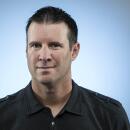Young Athletes’ Use of Stimulant Stirs Alarm
- Share via
Each day before he works out at a Fullerton gym, running back P.J. McNiff swallows a pair of Max Lean capsules. Soon after, his heart begins to beat faster, energy surging as he lifts weights to get in shape for the high school football season.
The dietary supplement, recommended to him by fellow body builders, contains ephedrine, an amphetamine-like compound. Although some question its safety, NcNiff, 18, does not.
“I use it every day, unless I’m not training,” said the senior at El Dorado High School in Placentia. “It makes you have more energy, you’re a lot faster and you feel better working out. For football, it’s been really important.”
As football practice gets underway at most Southland high schools this week, dietary supplements are prompting growing concern. Doctors say the stimulants can cause serious side effects and even death when taken before strenuous exercise such as football practice.
Although there are no statistics, dozens of coaches and players interviewed in recent days said the use of performance-enhancing products by high school athletes is widespread.
Across Southern California coaches are lecturing players about the dangers of supplements, sending home letters warning of side effects, and urging athletes to eat right instead of relying on capsules and powders.
“We’re addressing it because it scares the crud out of me,” said Rick Gibson, football coach at Woodbridge High School in Irvine. “Unfortunately, there are people out there who say the use of these items enables you to be a better athlete. There are kids using supplements in every high school football program in Orange County.”
Of particular concern is ephedrine, a stimulant that can have powerful effects on the nervous system and the heart by constricting blood vessels and increasing the heart rate. It is found in many over-the-counter supplements, sometimes going by the name ma huang.
Its use by teenagers and young adults is especially troubling, experts say. The National Collegiate Athletic Assn. bans athletes from taking ephedrine supplements. The governing body for high school sports in Southern California also prohibits their use.
Yet such restrictions have been disregarded at both levels.
An NCAA survey released last week found ephedrine use increasing among student athletes. Many of those student athletes surveyed said they had begun consuming dietary supplements in high school.
Each School Charged With Enforcing Ban
The California Interscholastic Federation’s Southern Section leaves it to individual schools to enforce the ephedrine ban. Coaches acknowledge that enforcement is spotty, because the supplements are legal and easily obtained at nutrition stores. A Southern Section spokesman said he knew of no cases in which an athlete was suspended from interscholastic sports for violating the ban.
Also last week, the National Football League barred its players from endorsing nutritional supplements that contain ephedrine, although players are allowed to use them.
California may soon impose restrictions as well. State Sen. Jackie Speier (D-Hillsborough) introduced legislation Tuesday that would prohibit the sale to minors of supplements containing ephedrine. Under her proposal, buyers would have to show proof of age.
Since 1994, products containing ephedrine have been linked to at least 80 deaths and more than 1,400 complaints by consumers reporting adverse side effects, the U.S. Food and Drug Administration says. Those include high blood pressure, paranoia, heart attacks, insomnia, nervousness, strokes and seizures.
Ephedrine and its byproducts can be found in popular over-the-counter products such as Ripped Fuel, Xenadrine and Hydroxycut at nutritional stores throughout the region. Manufacturers often promote the use of such products as a way to boost energy and enhance athletic performance.
But ephedrine can put a dangerous strain on the heart when coupled with steamy 90-degree heat and the pulse-pounding exercise demanded of football players, medical experts and others say.
Traces Found in 2 Players After Deaths
Traces of ephedrine were found in the bodies of two football players who died this year.
One was Florida State University’s Devaughn Darling, who collapsed Feb. 26 after a supervised off-season workout. Autopsy results were inconclusive.
Rashidi Wheeler, 22, of Ontario, a chronic asthmatic, died Aug. 3 while running a rigorous conditioning drill at Northwestern University. He had ephedrine in his system, according to a coroner’s report that listed the cause of death as exercise-induced bronchial asthma.
A third player, Curtis Jones, 34, a defensive lineman for a Utah-based indoor football team, died Aug. 5 after a game in Las Vegas. His wife said he had used ephedrine in the past. The cause of death has not been determined.
Some manufacturers and supplement distributors such as General Nutrition Center say ephedrine supplements are being criticized unfairly. When used in moderation, they say, ephedrine is highly effective at speeding up the metabolism and helping people burn off fat and calories.
“Our position is that [ephedrine] has the potential to be dangerous, just like anything else on the market,” said Sean Greene, president of Max Muscle, an Anaheim company that distributes Max Lean products.
He said his products carry labels warning people not to use them if they have high blood pressure, diabetes, heart problems and a range of other conditions. The labels also say the supplements can cause dizziness, sleeplessness, tremors and heart palpitations.
“But it’s a herb that has been used in Chinese Eastern culture for years. . . . If used in moderation, it can be a very effective and safe product,” he said.
A spokesman for General Nutrition Center, whose stores stock a wide assortment of supplements, sounded the same theme.
“We would not sell a product we did not believe to be safe when used according to the labeling on the product,” said spokesman Gregory Miller. “GNC simply takes the perspective that this is a decision not to be made just by student-athletes, but together with parents, coaches and trainers.”
A 17-year-old senior lineman at an Orange County high school said he began taking Ripped Fuel as a sophomore, swallowing one or two capsules before games to “get up.”
“It gives you a booster,” said the player, who is 6 feet 2 and 230 pounds. “You don’t want to take too many, of course, because that would be hazardous. But one or two, which was the recommended dosage, it really pumped you up. . . . I tried to take it before every game. I took it about 50% of the time, but would have taken it 100% if it was available.”
The player, whose parents did not want him to be identified, said he no longer uses the supplement, but he didn’t rule out taking it again.
Robert Davis, a 17-year-old receiver and defensive back at Royal High School in Simi Valley, said he was scared off supplements by the side effects. Davis, who is being recruited by Arizona State, California and Colorado, said he took Ultimate Orange for three days earlier this summer.
Ultimate Orange is an ephedrine-based powder manufactured by Next Nutrition of Carlsbad, Calif. The company stopped producing it in May, three months after paying $4 million to settle a lawsuit by a 32-year-old Gulf War veteran who said he suffered a stroke after using the product. Next Nutrition denied liability in that case. Remaining supplies are still available at some stores.
Davis, a 6-foot-3, 184-pounder, said his body went into overdrive after using Ultimate Orange.
“You’d just be sitting there and your heart would be racing,” he said. “You can’t just go hard and relax [after a workout]. Your body won’t stop working.”
Davis, who said he had trouble sleeping on the days he took Ultimate Orange, soon stopped.
“I’d go to bed at 11 or 12 o’clock and I wouldn’t fall asleep until 2 or 3,” he said. “I’d be laying there in the dark, but my mind and heart would be racing.”
McNiff, a 5-foot-8, 190-pounder, said he heard about Max Lean through other bodybuilders at the Powerhouse Gym in Fullerton. He said he began purchasing it about a year ago and has never had any problems.
“I’ve been using it for a long time, been training probably as intense as [college players], so I’m not worried at all,” he said. “I think [the media] are making too big a deal. [Players] are not using it right if it’s affecting them that much. The key is moderation.”
Student Diets Hard to Monitor, Coaches Say
Many high school coaches say they strenuously oppose supplements, but admit it is difficult--if not impossible--to monitor what every player ingests.
“I tell the kids, ‘Eat healthy,’ but if they go to GNC and buy supplements, I can’t say they can’t,” said Jeff Strycula, coach at Fontana High School.
Though NFL players are no longer allowed to endorse ephedrine supplements, past endorsements by such stars as running backs Marshall Faulk of the St. Louis Rams or Edgerrin James of the Indianapolis Colts made powerful impressions on high school athletes, said Tom Mitchell, a coach at Alta Loma High School in Rancho Cucamonga.
High school players “see these pro athletes take these [products] on commercials, and selling sports drinks and bodybuilding drinks,” Mitchell said. “I don’t think it’s right. I don’t think you have to do that to be competitive. I don’t approve of it.”
Neither does Sen. Speier. In addition to barring sales to minors, her bill would require warning labels on ephedrine supplements stating that exceeding the recommended dosage “may cause serious adverse health effects, including heart attack and stroke.” The label would also include a toll-free state number so consumers could report adverse reactions.
Speier became acquainted with ephedrine three years ago while at a Southland shopping mall, where a kiosk offered the product as a weight-loss tool.
“I got suckered into it, like most people do,” she said. “They’re sold as nutritional power bars, attractive to young women who want to try to deal with their weight, young men who are trying to establish their athletic prowess and to adults who are constantly trying to fight the battle of the bulge.
“I took a couple pills, and my heart was beating fast. My mouth was dry. I was lightheaded. I thought, ‘This is not right.’ So I just stopped.”
Manufacturers of ephedrine products face little federal oversight. Under a law passed by Congress in 1994, dietary supplement manufacturers are responsible for ensuring that their products are safe, but the supplements do not require FDA approval before going on the market.
Some doctors have expressed concern about ephedrine.
“I counsel anybody who asks me that it’s not wise or safe to take because of the potentially adverse reactions,” said Ronald Navarro, chief of orthopedic surgery at Kaiser Permanente in Harbor City. “There are many documented cases of use and overuse by athletes resulting in injuries to themselves, including death.”
Navarro said exceeding recommended dosages is a particular problem.
“They see this as an over-the-counter material and think it’s like [powdered] chocolate milk--two scoops is better than one,” he said.
Mike Mooney, football coach at Temple City High School, said he will try to persuade his players that they don’t need supplements.
“I’ll pull a label off whatever goofball supplement is being used,” he said, “and show them that if they eat decent food in correct quantities, they’re going to get the same stuff.”
*
Times staff writers Dan Arritt, Ben Bolch, Rob Fernas, Valerie Gutierrez, Gary Klein, John Ortega, Eric Sondheimer and Peter Yoon contributed to this story.
Join a discussion about high school athletes’ use of dietary supplements containing ephedrine on The Times’ Web site. Go to latimes.com/ephedrine
More to Read
Get our high school sports newsletter
Prep Rally is devoted to the SoCal high school sports experience, bringing you scores, stories and a behind-the-scenes look at what makes prep sports so popular.
You may occasionally receive promotional content from the Los Angeles Times.







